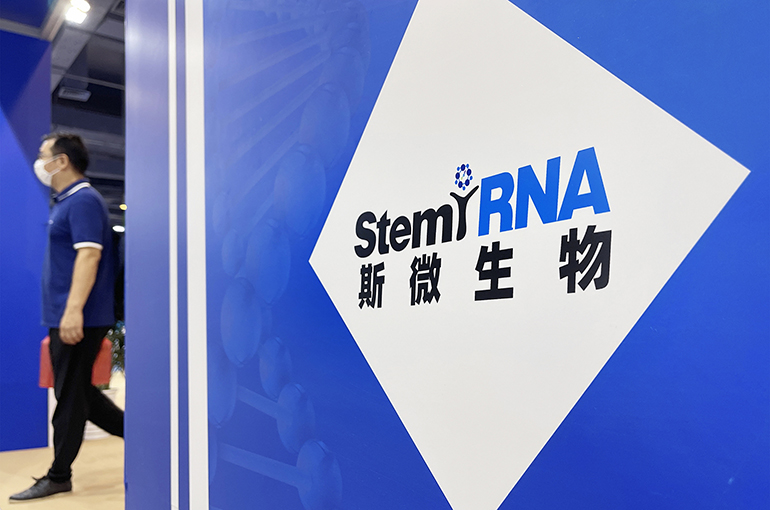 Lawsuits Swamp Stemirna as Chinese mRNA Jab Maker Struggles After Covid-19 Vaccine Boom
Lawsuits Swamp Stemirna as Chinese mRNA Jab Maker Struggles After Covid-19 Vaccine Boom(Yicai) Sept. 18 -- Stemirna Therapeutics is mired in litigation after the Chinese developer of innovative mRNA vaccines, whose factory for Covid-19 jabs has never generated any revenue, grapples with the demands of investors now that the pandemic has ended.
In the wake of one lawsuit, a Shanghai court last week named Stemirna a defaulter and barred Li Hangwen, the startup’s chairman and chief executive, from living a lavish lifestyle by imposing a high-level consumption ban on him.
The Shanghai-based firm is embroiled in 50 lawsuits, more than a third of which are disputes over procurement and sales contracts, according to publicly available information. Some are labor contract disputes. A case involving a property leasing contract worth up to CNY50 million (USD6.9 million) between Stemirna and former partner Tianci International Pharmaceutical will come before a court on Oct. 10.
Both Stemirna’s chairman and head of investor relations have yet to respond to Yicai about the latest court cases and rulings. An insider at the firm said "the company is still doing its business”, and his “colleagues are still working on it.”
As a developer of mRNA Covid-19 shots, Stemirna rode the wave of surging demand for novel coronavirus vaccines. In June 2021, it raised CNY1.2 billion (USD164.8 million) from major investors such as Sequoia Capital China.
The funds enabled Stemirna to increase its headcount to around 460 and to build a factory with an annual capacity of 400 million doses of mRNA jabs. But the facility has never made any money as the pandemic has abated and the firm’s Covid-19 vaccine, which was cleared for clinical trials in April 2022, has not been approved to go to market.
Stemirna halted production at the factory in July because of slack demand and will focus on the research and development of new products using mRNA technology, it said at the time.
Many Chinese mRNA vaccine developers are in a bind because they attracted a lot of investment at a time of much hype but now need to deliver, a medical sector veteran told Yicai. “Most investors know very little about mRNA technology,” he said. “When they invested in these startups they were blindly following the trend and were misled by vaccine developers’ exaggerations.”
Now that the boom in Covid-19 jabs is over, Chinese mRNA tech developers need to have enough funding and the ability to continue with R&D, the person said.
‘Shifting Focus’
“Pharmaceutical companies are shifting focus to the development of other mRNA products,” said the founder of a biomedical firm who has over a decade of investing in the pharma sector under his belt. “But new fields generally have high technical barriers, which means not all companies will succeed.”
There is a gap between Chinese firms’ mRNA technology and that of their overseas peers, he said, while investors who blindly piled in want products to come out and research to be commercialized as soon as possible.
When investors realized that the jabs would not reach the market quickly, they tried to recoup their investment earlier, making it harder for firms to raise more money, the person added.
Most of the insiders and scientists in the biomedical field that Yicai interviewed said tumors are the way to go for mRNA vaccines, but there are huge technical barriers as it is still not clear how some drugs work.
Extreme Difficulty
The scientific principles and technical difficulty of developing vaccines for tumors is “over an order of magnitude” higher than that of developing Covid-19 jabs, Xu Jianqing, a researcher at the Institutes of Biomedical Sciences at Fudan University, told Yicai.
“The core of vaccine technologies is actually in the upstream sector and future competition will mainly focus on the design of immunogens,” Xu said. “The level of difficulty is far beyond that of an ordinary jab and is extremely demanding for experienced R&D teams.
“This is the right direction and companies are urging their top teams to carry out such work,” said the founder of another Chinese biomedical startup, which has a tie-up with Germany’s BioNTech, one of the first companies to come up with an mRNA vaccine for Covid-19. “This includes how to organize resources, how to design immunogens, and how to find suitable targets,” he added.
He also said that biomedical startups should focus more on R&D and look for new directions of R&D, rather than listening to investors whose focus is on sales, production and other commercial activities. Commercialization can be done by listed companies with more resources, he said.
“It could be that only three or four large vaccine makers in China survive, although there will be a lot of companies focusing on R&D,” Xu said. “Whether these R&D companies can continue to exist or not mainly depends on whether they have advantages in immunogen design technologies.”
Editors: Tang Shihua, Kim Taylor